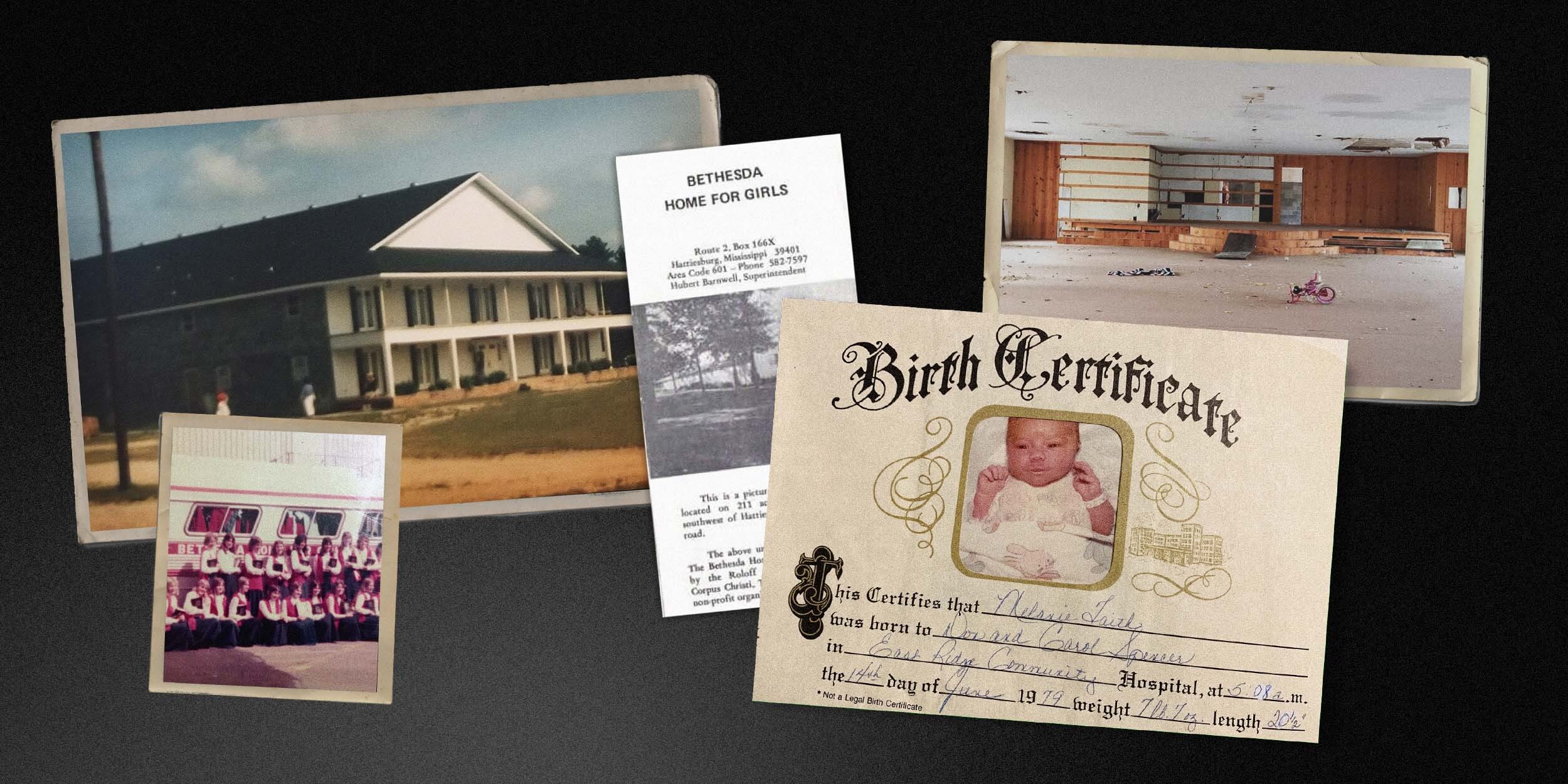
‘I wanted this baby’
Womac arrived at Bethesda in late 1978.
She had been raised by her grandparents, after her parents were unable to care for her and her siblings. But after Womac’s grandfather died and her grandmother was diagnosed with cancer, Womac was sent to an orphanage in Dalton, Georgia, when she was 10. She met her first boyfriend there, and at 16, she discovered she was pregnant.
The orphanage’s director feared the program would lose funding if people heard about the pregnancy, Womac said, so he sent her to Bethesda. (The orphanage has since closed; its former director didn’t respond to requests for comment.)
Initially, Womac was excited, because the move meant a chance to reunite with her younger sister, Cheryl Davis Blackwell, who had been sent to Bethesda a year earlier after the orphanage caught her smoking a cigarette. But then the orphanage’s director told Womac halfway through the car ride to Mississippi that her baby would be taken from her, she said. She panicked, and started trying to open the locked car door.
“I didn’t care if he was doing 100,” she said. “I was going to jump out because I wanted this baby.”
Womac found Bethesda an isolating, dismal place. She wasn’t allowed to speak with the other girls, including her sister, a rule the home imposed as a form of discipline. They were cut off from the outside world, with no ability to call friends or extended family. Their days were spent praying, cleaning, attending choir practice and listening to audio tapes of Roloff’s sermons. Womac once witnessed a girl refuse to get up at 5:30 a.m. to pray; staff members took the child to the shower room and “beat the holy daylights out of her,” she said.
Lester Roloff speaks to a crowd in the Suburban Heights Baptist Church in Fairfield, Iowa, in 1981. (AP file)
Lester Roloff speaks to a crowd in the Suburban Heights Baptist Church in Fairfield, Iowa, in 1981. (AP file)
“Once you’re there, survival mode kicks in,” she said. “You think just day by day, ‘What can I do to keep from getting slapped or hit or punched or hurt?’ You pretty much just try to keep to yourself, keep your mouth shut.”
When Womac did speak up, she tried to convince the staff to let her keep her baby. The home’s employees replied that she had “no right” to the child, she said; the baby would go to “people that deserve a family, and you don’t.”
Blackwell said her own excitement to see her sister at Bethesda quickly turned to devastation, “knowing the abuse that laid ahead for her.” When Blackwell had kitchen duty, she said, she tried to sneak scraps of toast for Womac because she did not get any extra food despite being pregnant. Womac hid in a closet to eat it.
A few weeks before Womac went into labor, Bethesda flew her to Chattanooga, Tennessee, to live with a host family, who took her to the hospital for the birth. She was given sedatives and remembers very little of the delivery.
When she woke up the next day, the nurses refused to let her see her child, or even tell her if she had a boy or girl. After one of them finally let it slip that she’d had a girl, Womac asked a doctor if she could see her daughter. But the doctor became furious, Womac said, and demanded to know which nurse revealed the baby’s sex, so he could fire the nurse. The response gutted her.
“I’ll remember that until I die,” she said.
Womac left the hospital without any records to show she’d ever had a baby.
Womac’s aunt took her and her sister in, freeing them from Bethesda. Womac had a difficult time adjusting. When she went to her first party with alcohol, she felt paranoid that someone would catch her being “sinful” and send her back to Bethesda.
Womac, left, with Blackwell on Womac’s wedding day in 1980.
Womac, left, with Blackwell on Womac’s wedding day in 1980.
She got married within a year, and had five other children. But she never stopped thinking about her first daughter, imagining her first day of school and other milestones. She baked a cake on her daughter’s birthday each year, and tried, as best she could, to avoid talking about it.
“You don’t get past it,” she said, “because I missed out on her first step, her losing her first tooth, her calling me mom.”
A $250 deal in a parking lot
Under Mississippi law at the time, a birth mother — even as a minor — had the right to decide whether to place her child for adoption. To do so, she would need to sign a consent agreement. Once signed, depending on the state where the birth took place, the mother would have only a very short window to challenge the adoption in court. Womac did not recall signing anything, but others at Bethesda did.
Donna, who is being identified only by her first name because she hasn’t told close family members what happened to her, said she remembers that after she gave birth in 1980, while she still had a fever in the hospital, some men in suits asked her to sign papers.
Leda Rush said when she gave birth in 1983, she was asked to sign paperwork after her delivery, but she was too drugged to read it.
Joanne Springberg said when she was at Bethesda in 1983, employees told her she’d never see family again if she didn’t sign over her baby.
“I feel like my baby was stolen,” Springberg said. “They took that family away from me. I might’ve gotten married to the guy who is the father. How could they steal your child? And they did it in the name of God, so then you grow up not believing in the name of God.”
Pregnant girls were sent to Bethesda from across the country and then traveled elsewhere to give birth.
See their paths in the map below.
Travel to Bethesda Travel to birth location Hattiesburg, M.S. <!–
Map represents six girls’ journeys from 1976 to 1984.
–>
Trisha Hass, who was sent to Bethesda in 1983, said she once accompanied Betty Wills and a pregnant girl on what she thought was a grocery store trip after lunch. Less than 10 minutes into the ride, however, the girl began going into labor in the back of a van, Hass said.
They stopped in the parking lot of a Piggly Wiggly supermarket, and after the baby was born, Wills wrapped the child in a blanket and went to a pay phone, Hass said. About 40 minutes later, at dusk, a car pulled up next to them. A man stepped out and handed over $250 in cash, which Hass said she was required to count, and Wills gave him the child.
“I don’t think I’ve ever been more scared to make sure I counted correctly,” Hass said. “I sat in the front passenger seat, kept my head down, and didn’t ask questions.”
The next day, the girl was gone from Bethesda, Hass said, “and no one said anything about why she was no longer there.”
Mississippi enacted a ban on child selling in 2009. Attempts to create a federal ban on the sale of children — most recently a 2019 proposal by Sen. Cindy Hyde-Smith, a Republican from Mississippi — have failed to pass Congress.
Some girls left with a different perspective on their experience at Bethesda. Delores Dodson was 15 and pregnant when her father sent her to Bethesda in 1975 — and she said she knew all along that her baby would be placed for adoption. It was not a choice she resented.
“Here I am, a very young lady, I was pregnant — I couldn’t obviously afford to care for myself and care for my child,” Dodson said. “It was the best option in their thinking, and once I got to the home, they made it very comfortable for us girls.”
Dodson, now a missionary in Tanzania, acknowledged that the girls’ lives at Bethesda were tightly controlled and their mail was monitored, but said she did not experience abuse or corporal punishment. She said she was surprised and saddened to hear that other women did.
“They were very strict,” she said of Bethesda’s staff members, “but those were rules I was accustomed to because my dad was a pastor.”
A hidden note
In January 1982, Morris Dees, a lawyer known for taking on white supremacists as a co-founder of the Southern Poverty Law Center, received a call from a police officer. The officer was upset because Bethesda refused to let his pregnant daughter, Candy, leave. Dees agreed to help. He flew from Montgomery, Alabama, to Hattiesburg. A local police detective drove him to Bethesda and they banged on the door, which was chained shut.
“When it opened, I saw about 25 to 30 girls standing around in religious clothes, quoting the Bible,” Dees said. He called out for Candy, and “she ran straight to us, anxious as hell to get out,” Dees said. Flying back to Montgomery, she told Dees everything about life inside Bethesda.
Dees quickly began putting together a federal class-action lawsuit against Bethesda and some ministers who supported it, accusing them of discriminating against pregnant girls, violating the girls’ reproductive privacy and holding them as indentured servants. The suit alleged that Bethesda censored the girls’ communication, beat them and had a system to sell their babies.
Until this point, Bethesda had faced little controversy. Instead, the Willses were praised by local newspapers for creating a “haven” where miracles took place. The girls’ previous complaints had been minimized in the press, which described them as “unhappy under the strict rules.” Roloff had featured Bethesda in a promotional video as evidence of the positive influence of his homes.
When the lawsuit was filed, Bobby Ray Wills called it a “pack of lies.”
“It was very careless and unwise to attack us,” Wills told an Alabama newspaper in February 1982. “They’re really going to be sorry.”
A cavalry quickly assembled to help Bethesda. The local prosecutor and sheriff insisted there was no abuse at the home. Members of the Conservative Caucus, which at the time was an influential political group in Washington, circulated memos warning that if the lawsuit succeeded, “the implications would be devastating for similar ministries.” Falwell, the Baptist minister and prominent conservative activist, headlined a rally in Hattiesburg to support Bethesda. He and others argued that the home was no different than a church, and that they were being persecuted for their beliefs.
The Christian Law Association, a nonprofit law firm from Ohio, represented Bethesda, incensed that a minister on Bethesda’s board of directors had been served a copy of the lawsuit during a worship service. The firm tried unsuccessfully to get the case dismissed.
Before the case could move forward, though, Dees needed more corroboration.
Morris Dees, shown in 1973, challenged Bethesda in court. (Gary Settle/The New York Times/Redux)
Morris Dees, shown in 1973, challenged Bethesda in court. (Gary Settle/The New York Times/Redux)
Dees received court approval to take depositions from girls living in the home, but the real challenge was in convincing the girls that they were safe to speak. The home had a rule against saying anything negative about the facility, and the first depositions took place on Feb. 26, 1982, at a local office with Wills in the room. The girls kept telling the lawyers they were treated fine. But Dees said that their body language, and that they kept an eye on Wills, made it clear the girls “were scared to death.”
So after four depositions, Dees said he turned to Bethesda’s team and made a proposal: “Well heck, how about letting us just talk to the next girl with none of y’all in the room? We won’t take a deposition, but it looks like we may have made a bad mistake in filing this lawsuit.”
Bethesda’s lawyers agreed, Dees said, and left his team alone with the next teenager, identified in court documents as Tonya B. With tears running down her cheeks, Tonya handed Dees a note she had hidden in her bra.
“I really wish we could talk to you but at this moment it seems impossible,” her note stated, according to court records. The note, signed by several other girls, offered to provide testimony and evidence, but said they’d need protection because “there is no telling what will happen to us.”
It was the break Dees needed. He made copies of the note and filed it as evidence in court that same day. Tonya and the other girls who signed the note were allowed to return home to their parents.
Throughout the spring of 1982, the girls testified in court hearings about the abuse they said they’d experienced at Bethesda and the effect it had on them. Dozens reported that they stopped menstruating for months, court records state, which a doctor later compared in court filings to conditions observed among women in concentration camps.
Bethesda responded in court that its employees used corporal punishment sparingly, as a last resort. They never pressured anyone to give up their baby; they merely counseled them on the girl’s best option, the home’s lawyers argued. And they said many girls in Bethesda stopped menstruating because they were getting clean after being on drugs.
Bobby Ray Wills became indignant when asked in court, on March 9, 1982, if he sold newborns: “That statement is un-Christian,” he said. “I don’t make money off babies.”
While adoptive parents were always asked if they or their church would give money to the Bethesda, Wills said, those were voluntary donations.
“I’d give my life for these girls,” Betty Wills testified. She added that she hated spanking the girls, but it was all that prevented them from returning to “sex, drugs and running with truckers.”
“Mr. Dees, I love you and I wish you were saved,” she said in court, according to newspaper accounts.
‘Judge, get me out of here’
While the lawsuit dragged on, parents kept sending girls to Bethesda. Then, in early 1984, a girl identified in court records as M.I. ran away from the home, told county officials she’d been mistreated and refused to go back.
To figure out what to do, the county’s youth court appointed Wise to handle the case as a special referee, essentially a temporary judge.
Wise, whose Southern accent becomes more animated when he recalls Bethesda, visited the home in March 1984 with a sheriff’s deputy. More than 100 girls were living there, many wearing red and white dresses.
Bobby Ray Wills asked the girls to “witness” to him, Wise said, “and they just started randomly popping up in the audience, and they all have a little spiel, like, ‘I was a drug addict and a girl in sin, and Roloff’s ministries brought me to Jesus and saved my life.’”
Then, Wise said, one girl in the back jumped up and said, “Judge, get me out of here — they’re beating us!” Wills “looked like he was about to have a heart attack,” Wise said.
Wise brought in social workers and police officers who took over the home for a few days and interviewed the girls. Many described being strip-searched, placed on a limited diet of only juice or half-portions of food, and beaten when they complained.
While Mississippi didn’t have any regulations at the time governing how child care centers could treat children, Wise ruled that because Bethesda held girls under lock and key without a judicial hearing, it was an illegal detention center. The court placed an injunction on Bethesda in September 1986, blocking the home from using corporal punishment, requiring the Willses to open up to fire marshal inspections and stop censoring girls’ communication with parents.
Bethesda claimed that it had permission from girls’ parents for everything it did, but its appeals were shot down. State authorities became concerned that Wills had moved children across state lines for performances and births. In September 1986, he was found in contempt of court for refusing to provide the names of all of the girls held in Bethesda, and the state took custody of the children.
“What do you do with 117 girls from all over America who are getting the s— beat out of them by some wackadoodle?” Wise said. “I had to decide whether to give them back to parents, who were either crazy enough to go along with this, or were tricked by these guys.” (The state ultimately called their parents to come take them home.)
Soon after, Dees’ case reached a conclusion when a federal judge signed off on a settlement that reinforced many of the temporary rules local judges had recently imposed.
In 1987, the Willses packed up Bethesda and left for Missouri, where Christian youth facilities faced no government oversight. They opened a new boarding school, but complaints against their program followed, and in 2004 they shuttered their Missouri operation as well. They said this choice was unrelated to the pushback.
‘I have wondered about you for a long time’
In the 1970s, Carol Spencer and her husband began looking into adoption. A couple they met at church suggested they apply through Roloff’s organization. They did, and in 1979 they received a call about a soon-to-be-born child they could adopt. All they had to do was pay for the mother’s hospital bills, she said.
“We were just happy to have a little girl to take care of and to love,” Carol Spencer said.
The Spencers arrived at the hospital in East Ridge, Tennessee, not long after Womac gave birth. In the nursery, they could immediately tell which baby was theirs; she was the one without a name.
Carol Spencer carried her out of the hospital at four days old, a “joyful occasion” as she recalled it. They named her Melanie.
Source: | This article originally belongs to Nbcnews.com










